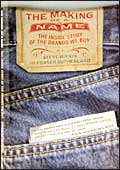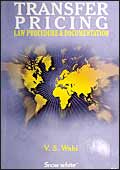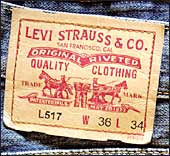|
One
sure way to set the species apart, someone must've found, was
to create art (okay, all ye quadripeds, try that!). The quadripeds
struck back by having their butts branded with hot iron for instant
identification. Modern marketers are pleased to report that we
bipeds have gone one-up on this too-just look at the cover jacket
of this book.
Written by brand differentiation experts
Steve Rivkin and Fraser Sutherland, The Making of a Name: The
Inside Story of the Brands We Buy features a mock-up of Levi Strauss
& Co.'s famous leather patch. Labels, of course, have been
around quite awhile longer than this brand of jeans. Labels, big
and small. Labels, thick and sticky. It's the brand-aware who
make it a matter of self-given freedom of choice; who see in the
weft n' waft (or rivet furnaces) of denim the fabrication of a
rugged myth; who chuckle at their own silliness; and who choose
a brand that's only too pleased to shear itself to its bare no-nonsense
essence (or 'morpheme', a minimal unit of meaning).
Ah, but let's not rivet our attention on
jostling jeans. This is actually a book about names, and it begins
innocently with Shakespeare's "What's in a name?" before
going all academic. It does a professorial job of raking up etymology
and morphology (the study of word forms) for the cause of business
and its relationship with people's minds (and wallets). And boy,
a casual relationship it sure ain't. In a world of discourse on
McWorld and Coca-colonisation, brands are big. Brands are not
to be ignored.
 |
THE MAKING OF A NAME
By Steve Rivkin &
Fraser Sutherland
Oxford University Press
PP: 276
Price: Rs 1,232
|
An innocent book it is,
but provokes the brand-aware-or those we think they're brand-aware-all
the same. How so? With stories of brand origins that sound a little
too pat for comfort. As if they're itching to set the record straight
in some way. Is Apple an "arbitrary name" that struck
Steve Jobs simply as a "perfect fruit", or is it an
"allusive name" with a forbidden byte of knowledge?
Does Duracell work so durably because it's "short, crisp
and concise" in offering a benefit, or does it convey something
more? Is Viagra suggestive of 'vigour' and 'Niagara', or a place
'via Agra' that gave the Mughal emperor Akbar an heir and legacy?
It's open to interpretation, surely. The
few Indian references, by the way, are even more huh-worthy. Now,
now, now, Yes Bank couldn't be inspired by egg.com, could it?
A good thing this book stays away from the 'K' craze in entertainment.
You never know what it might've ascribed it to, given how blissfully
it credits the 1930s' travel writer Geoff Moorhouse with coining
the name of an entire country, no less.
Still, the huh-after-huh experience is stirring
enough to recommend a read. And there's more. A good name, the
authors theorise, "sets up a communication premise"
via associations and implications to make its selling proposition
clear. While on clarity, Rivkin and Sutherland are in their element
talking about language. Take the chapter The Sound Of Sales-on
the origin of speech. They quote the Danish linguist Otto Jespersen's
theories, "each with evocative labels", on how mankind
first learnt to speak: from 'Bow-wow' (imitating sounds of nature)
and 'Pooh-pooh' (expressing instincts) to 'Yo-he-ho' (grunting
at work) and 'La-la' (singing in poetic love).
Oral exertions have sure come a long way
since. Or maybe not. Among the nuttier parts of the book is the
bit about Coca-Cola in China, where the great globaliser stumbled
from a phonetic version of the brand that sounded like 'bite the
wax tadpole' to the more saleably stretched 'happiness in the
mouth'. It worked.
For those to whom brand stretching is about
snuggling onto a different product altogether, the book cites
the instance of Lycra, an elastic fibre brand that threw open
its doors as a hospitality banner in Brazil, and under no compulsion
beyond the need for wider brand appeal. "The ultimate branding,"
though, goes the book, "occurs when a name, image, and delivery
system fuse into a seamless entity." An example? L'eggs,
which sells in egg-packaging, the hosiery brand from Hanes...
yes, of 'no scratchy labels' fame in the Indian undies market.
Another fun brand that gets itself off by poking pomposity.
The point, dear Naomi Klein, is this. To
be brand-aware is to be discerning: of ideas, of ideals, of propositions.
Logo or no logo, genuine brands do exist. As do honest science
and earnest art. And there's no better economic stimulant than
all those voluble voices vying freely with one another, brand
message upon message. It's called an 'open market'. It's noisy,
yes, and full of cons too. But even a roar can make music-if it's
a coherent roar. For truth.
-Aresh Shirali
 |
TRANSFER PRICING
By V.S. Wahi
Snow White Publications
PP: 420
Price: Rs 595 |
As cross-border
business expands, issues and complexities of transfer pricing
are occupying increasing space in management minds. It's but a
natural upshot of globalisation. "When enterprises of a group
have business activities in different countries, they can determine
the level of taxation in a particular country by adjusting the
price mechanism," as the author, Chief Commissioner of Income
Tax V.S. Wahi explains, "They can also employ methods to
minimise their tax liability; by shifting their profit base, from
high to low tax jurisdictions." Indeed, price jugglery can
dodge taxes by exploiting different tax codes in different parts
of the world, and there are full-time minds on the job in companies
nowadays.
But the world's tax administrators are nobody's
fools; they are furiously plugging all the holes. This informative
book, aimed at both business managers and tax administrators in
India, is written with the expertise of one who has watched transactions
closely for signs of shadiness. It goes into the details of transfer
pricing regulations in India and other countries, explaining the
"arm's length principle" and the like. Entire chapters
are devoted to India's taxation treaties with other countries
and the perplexities thrown up by e-commerce. The book is also
a reminder that frictionless commerce in a borderless world is
still just a dream.
 |
THE FINAL SETTLEMENT
By Sundeep Waslekar
Strategic Foresight Group
PP: 110
Price: Rs 250 |
This is the sort of
title that causes gulps to go down throats. That The Final Settlement:
Restructing India-Pakistan Relations is authored by Sundeep Waslekar,
a hardnosed peace analyst at the Strategic Foresight Group, just
adds to the taut nerves. While the two neighbours have wisely
avoided the prejudgments of the West Asian kind (the 'writing
on the wall' planned for Jerusalem), crunching a two-decade timeframe
into a two-year peace dash could prove reckless. "No loc
hardening" versus "No division" is still sinking
in; so why rush the 'final' talks?
Waslekar's purpose is to induce urgency-moderated
with realism. "If India is serious about being a lion with
four heads that looks around in all directions with confidence,
it should be aspiring to negotiate the formulation of global political
and economic structures," he writes. "We believe the
desire for peace is as genuine as the obstacles impeding it."
Pakistan's "identity crisis" apart, an impending water
crisis has set the danger clock ticking, he cautions, and an overarching
solution must emerge from the principle of unity. Before time
runs out.
|







